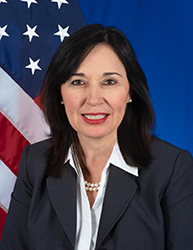Sexual Assault Awareness month: Awareness and action needed for prevention
- Details
- Category: Opinion
- Published: Wednesday, 28 April 2021 21:46
- Written by Bill Jaynes
- Hits: 45494
US Ambassador
Carmen G. Cantor
 April is Sexual Assault Awareness Month (SAAM). Each April is a time to take stock and for each of us to ask, “How can I raise awareness and become more of a positive change agent?” A quote from the National Sexual Violence Resource Center website puts the issue in perspective:
April is Sexual Assault Awareness Month (SAAM). Each April is a time to take stock and for each of us to ask, “How can I raise awareness and become more of a positive change agent?” A quote from the National Sexual Violence Resource Center website puts the issue in perspective:
“Even before its official declaration, SAAM was about both awareness and prevention of sexual assault, harassment, and abuse. Looking at the history of the movement to end sexual violence, it’s clear why: It’s impossible to prevent an issue no one knows about, and it’s difficult to make people aware of a problem without providing a solution. The two work in tandem, and they always have.”
Becoming informed about sexual abuse doesn’t occur without painful reflection and acknowledgement of the sobering facts of sexual abuse worldwide, heightened this last year by the conditions of our global Covid-19 pandemic: According to the United Nations Report: The World’s Women 2020: Trends and Statistics:
“Violence against women and girls remains a global issue. During COVID-19 lockdowns, many women and girls have been isolated in unsafe environments where they are at heightened risk of experiencing intimate partner violence. Around one third of women worldwide have experienced physical and/or sexual violence by an intimate partner; and 18% have experienced such violence in the past 12 months.”
No country escapes the searing negative consequences of Sexual Abuse. According to the Department of Justice, 1 in 4 women and 1 out of 6 men in the United States are sexually abused in their lifetime.
The Department of State’s Micronesia 2020 Human Rights Report touches on the issue, and notes the challenges here, stating “Due in part to social stigma, family pressure, fear of further assault, or the belief that police would not involve themselves in what is often seen as a private family matter, such crimes were underreported, and authorities prosecuted few cases.”
There is much that can be done. Armed with awareness of the issue, we can continue to advocate within our communities. I recently gave opening remarks at the 2021 Guam Collaboration Project Roundtable for the Guam Coalition Against Sexual Assault & Family Violence. Part One of this virtual event looked at the underpinning history and culture of violence. Part Two highlighted regional partners and resources to counter sexual abuse.
As a member of the FSM community, the United States Embassy continues to collaborate with the National, State and Municipal governments; and various women and youth groups with supporting solutions to sexual assault and family violence in FSM. One takeaway experts have shared is the underlying value for women to have the economic power to make their own decisions.
In order to support these goals, the U.S. Government is providing financing to the International Office of Migration to implement a grant to improve women’s economic development across the Freely Associated States. The U.S. Embassy and IOM in FSM have already hosted several events for this grant, which has powerful objectives: to raise awareness of gender discrimination, teach women how to lead their own businesses, and provide grants to small, women owned businesses and organizations. Giving women the financial power, and spurring development of skill and self-esteem serves women and their communities by being able live more resilient lives, and make life decisions from a position of strength.
Last year, the Embassy participated in the #BlackOutViolencePohnpei campaign and we walked around the entire island of Pohnpei to raise awareness about domestic violence. This April, we are supporting Sexual Assault Awareness Month through April by wearing black and posting photos online every Thursday with various local groups. The movement is gaining momentum, U.S. Embassies in Suva, Majuro, and Koror joined our online campaign April 15. We used our collective message, “U.S. Embassy staff throughout the Oceania region wear black to demonstrate support for Sexual Assault Awareness Month. We stand together to raise awareness that sexual harassment, assault, and abuse can happen anywhere. We urge governments, law enforcement, NGOs, and individuals to begin honest conversations about sexual violence, support survivors, and take action to prevent sexual violence in all its forms.”
I invite you to join us and wear black every Thursday in April. Together we can raise awareness and work towards our ultimate goal to stop and prevent sexual assault and gender based violence.




